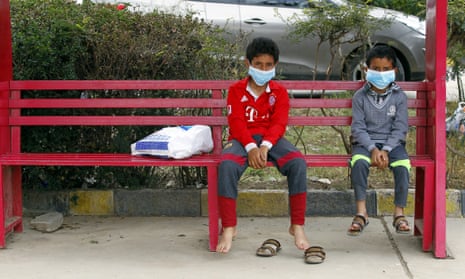Cholera has killed at least 115 people in the Yemeni capital, Sana’a, the local Saba news agency said, after authorities on Sunday declared a state of emergency over the outbreak and called for international help to avert disaster.
Sana’a is controlled by the armed Houthi movement, which is aligned with Iran and fighting a western-backed, Saudi-led coalition. More than 10,000 people have been killed and millions displaced in more than two years of war, which has also destroyed much of the country’s infrastructure.
Only a few medical facilities are still functioning and two-thirds of the population are without access to safe drinking water, the United Nations has said.
“What is happening today exceeds the capabilities of any healthy health system, so how can we [cope] when we are in these difficult and complicated conditions?” Saba quoted the Houthi-run administration’s health minister Mohammed Salem bin Hafeedh as saying.
After meeting in Sana’a with UN humanitarian coordinator Jamie McGoldrick and other international officials, the minister called on humanitarian organisations and aid donors to help it avert an “unprecedented disaster”.
He urged donor countries to fulfil more than $1bn (£775m) in aid pledges made in Geneva in April.
Saba said 8,595 suspected cholera cases were recorded in Sana’a and other Yemeni provinces between 27 April and 13 May, while laboratory-confirmed cases were 213.
The World Health Organization (WHO) earlier put the death toll at 51. It has also said that 7.6 million people in Yemen live in areas at high risk of cholera transmission.
A cholera epidemic late last year slowly abated but outbreaks are becoming more frequent.
Sana’a has been worst hit, followed by the surrounding province of Amanat al-Semah, WHO data has shown. Cases have also been reported in other major cities including Hodeidah, Taiz and Aden.
The World Health Organization said last month that fewer than 45% of health facilities in Yemen are now fully functioning, and that the flow of “essential medicines” has fallen by nearly 70%.
An estimated 17 million of Yemen’s 26 million population lack sufficient food and at least 3 million malnourished children are in “grave peril”, the UN has also said.
Yemen is one of four countries at risk of, or experiencing, famine. In February, famine was declared in parts of South Sudan, with warnings for Nigeria and Somalia.
